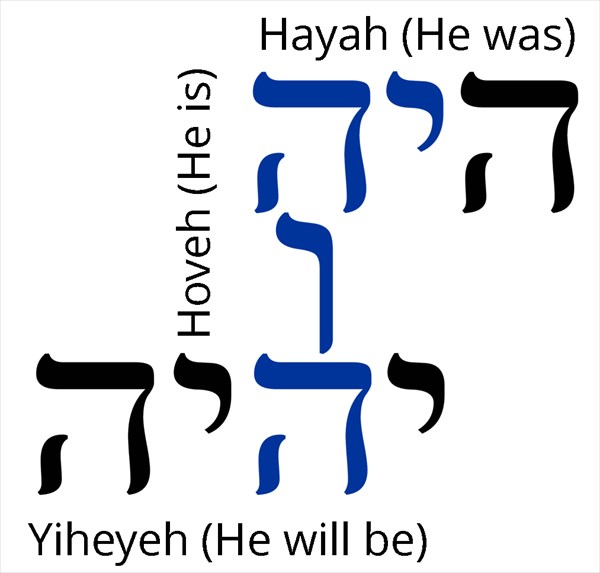- Home
- Events
- Library
- About 10/40
- International Torah Study
Afrikaans
العربية
Հայերեն
বাংলা
Bosanski
简体中文
繁體中文
Nederlands
English
Filipino
Français
Deutsch
Kreyol ayisyen
עִבְרִית
हिन्दी
Hmong
Bahasa Indonesia
Gaeilge
Italiano
日本語
ភាសាខ្មែរ
한국어
Кыргызча
ພາສາລາວ
Bahasa Melayu
ဗမာစာ
پښتو
فارسی
Polski
Português
Română
Русский
Српски језик
سنڌي
Afsoomaali
Español
Basa Sunda
Kiswahili
ไทย
Tiếng Việt
Yorùbá
Zulu
Top Insights
Recent Posts

Does Yehovah Mean Lord of Destruction?
original article: http://seekingtruth.info/blog/does-yehovah-mean-lord-of-destruction/

Some people are objecting to the pronunciation of Yehovah because they claim it means something like “Lord of Destruction”. This couldn’t be further from the truth.
This ignorant theory comes from two baseless assumptions. 1 – that “Yeh” or “Yah” means “Lord” or “God” and 2 – that “hovah” in Hebrew can only mean destruction.
Let’s first deal with assumption #1 – the meaning of “Yeh” or “Yah”
Yah (יהּ) appears in 43 verses in the Tanakh: 2 verses in Exodus, 3 verses in Isaiah, 37 verses in Psalms and 1 verse in Song of Solomon. References are listed at the end of this post. Yah (יהּ) is a contracted form of יהוה – just like John is a contracted form of Jonathan. When we read Yah, the writer intends us to think of יהוה – His personal Name. So Yah does not mean “god” it means יהוה.
Where names in Hebrew take the form “God of” they begin or end with “El”, for example Eliezer which means “God is help” or Israel which means “God prevails”. There are many examples to show that incorporating the term “God” into a name uses “El” and not “Yah”.
But what about “Lord”? Where the term Lord is incorporated into names it uses “Adon” as in Adoni-Bezek, “my lord is Besek” or Adoniyah, “my lord is Yehovah”. Here in Adoniyah we see a direct use of “Yah” referring to Yehovah and not to a title like God or Lord.
So clearly there is no linguistic or textual support for claiming that Yah means “lord” or “god”.
So what of the second assumption, that “hovah” means destruction and only destruction?
It is true that the NOUN hôvâh (הוה) means ruin or disaster, however hovah is also a VERB which means “is” as in present tense being.
When יהוה spoke to Moshe in Exodus 3; He prefaced the declaration of His Name with a very important concept – אהיה אשׁר אהיה – which literally means “I will be who I will be” or, for a more nuanced translation, “I am now and I will continue to be in the future”. He then declares His Name by which He is to be remembered/mentioned for all generations – יהוה. The root of יהוה is the verb היה Hayah/Ehyeh, which means “to be”. The past, present and future forms of hayah which make up the Father’s Name are Hayah, Hoveh & Yiheyeh, meaning “He was, He is, He will be”. Yehovah’s very name speaks to His eternal nature.
The root of “hovah” is הוה – which is a noun – a static thing, no action – and and does not have the same letters as the root for “hayah”. That there is a noun “hovah” has no relationship to the Father’s name when His Name is clearly based on the verb “Hayah/Ehyeh”.
Verses which use Yah, the poetic form of Yehovah, in the Tanakh (Young’s Literal Translation with J corrected to Y):
Exodus 15:2 My strength and song is Yah, And He is become my salvation: This [is] my God, and I glorify Him; God of my father, and I exalt Him.
Exodus 17:16 and saith, `Because a hand [is] on the throne of Yah, war [is] to Yehovah with Amalek from generation — generation.’
Isaiah 12:2 Lo, God [is] my salvation, I trust, and fear not, For my strength and song [is] Yah Yehovah, And He is to me for salvation.
Isaiah 26:4 Trust ye in Yehovah for ever, For in Yah Yehovah [is] a rock of ages
Isaiah 38:11 I said, I do not see Yah — Yah! In the land of the living, I do not behold man any more, With the inhabitants of the world.
Psalm 68:4 Sing ye to God — praise His name, Raise up a highway for Him who is riding in deserts, In Yah [is] His name, and exult before Him.
Psalm 68:18 Thou hast ascended on high, Thou hast taken captive captivity, Thou hast taken gifts for men, That even the refractory may rest, O Yah God.
Psalm 77:11 I mention the doings of Yah, For I remember of old Thy wonders,
Psalm 89:8 O Yehovah, God of Hosts, Who [is] like Thee — a strong Yah? And Thy faithfulness [is] round about Thee.
Psalm 94:7 And they say, `Yehovah doth not see, And the God of Jacob doth not consider.’
Psalm 94:12 O the happiness of the man Whom Thou instructest, O Yah, And out of Thy law teachest him,
Psalm 102:18 This is written for a later generation, And the people created do praise Yah.
Psalm 106:1 Praise ye Yah, give thanks to Yehovah, For good, for to the age, is His kindness.
Psalm 106:48 Blessed is Yehovah, God of Israel, From the age even unto the age. And all the people said, `Amen, praise Yah!’
Psalm 111:1 Praise ye Yah! I thank Yehovah with the whole heart, In the secret meeting of the upright, And of the company.
Psalm 112:1 Praise ye Yah! O the happiness of one fearing Yehovah, In His commands he hath delighted greatly.
Psalm 113:1 Praise ye Yah! Praise, ye servants of Yehovah. Praise the name of Yehovah.
Psalm 113:9 Causing the barren one of the house to sit, A joyful mother of sons; praise ye Yah!
Psalm 115:17 The dead praise not Yah, Nor any going down to silence.
Psalm 115:18 And we, we bless Yah, From henceforth, and unto the age. Praise ye Yah!
Psalm 116:19 In the courts of the house of Yehovah, In thy midst, O Jerusalem, praise ye Yah!
Psalm 117:2 For mighty to us hath been His kindness, And the truth of Yehovah is to the age. Praise ye Yah!
Psalm 118:5 From the straitness I called Yah, Yah answered me in a broad place.
Psalm 118:14 My strength and song [is] Yah, And He is to me for salvation.
Psalm 118:17 I do not die, but live, And recount the works of Yah,
Psalm 118:18 Yah hath sorely chastened me, And to death hath not given me up.
Psalm 118:19 Open the gates of righteousness for me; I will enter them and thank Yah.
Psalm 122:4 For thither have tribes gone up, Tribes of Yah, companies of Israel, To give thanks to the name of Yehovah.
Psalm 135:1 Praise ye Yah! Praise ye the name of Yehovah, Praise, ye servants of Yehovah,
Psalm 135:3 Praise ye Yah! for Yehovah [is] good, Sing praise to His name, for [it is] pleasant.
Psalm 135:4 For Jacob hath Yah chosen for Himself, Israel for His peculiar treasure.
Psalm 135:21 Blessed [is] Yehovah from Zion, Inhabiting Jerusalem — praise ye Yah!
Psalm 146:1 Praise ye Yah! Praise, O my soul, Yehovah.
Psalm 146:10 Yehovah doth reign to the age, Thy God, O Zion, to generation and generation, Praise ye Yah!
Psalm 147:1 Praise ye Yah! For it is good to praise our God, For pleasant–comely is praise.
Psalm 147:20 He hath not done so to any nation, As to judgments, they have not known them. Praise ye Yah!
Psalm 148:1 Praise ye Yah! Praise ye Yehovah from the heavens, Praise ye Him in high places.
Psalm 148:14 And He exalteth the horn of His people, The praise of all His saints, Of the sons of Israel, a people near Him. Praise ye Yah!
Psalm 149:1 Praise ye Yah! Sing ye to Yehovah a new song, His praise in an assembly of saints.
Psalm 149:9 To do among them the judgment written, An honour it is for all his saints. Praise ye Yah!
Psalm 150:1 Praise ye Yah! Praise ye God in His holy place, Praise Him in the expanse of His strength.
Psalm 150:6 All that doth breathe doth praise Yah! Praise ye Yah!
Song of Solomon 8:6 Set me as a seal on thy heart, as a seal on thine arm, For strong as death is love, Sharp as Sheol is jealousy, Its burnings [are] burnings of fire, a flame of Yah!
Translate

Related Articles
WHY NOT THE NAME JESUS? VIDEO SERIES
Most of us did not start our spiritual journey with a Torah-observant...
By 10-40 AdminFebruary 2, 2023Aaronic Benediction/ The Priestly Blessing
Nehemia Gordon speaks on the topic of the Priestly Blessing of Numbers...
By 10-40 AdminJanuary 31, 2023The Nomadic Hebrews – Part 3 of 3
The culture and lifestyle of the Hebrew nomads have a direct relationship...
By 10-40 AdminJanuary 29, 2023Was the Bible correct that pork is truly an unclean meat?
Pigs also do not have sweat glands. Perspiration is a key method...
By 10-40 AdminJanuary 18, 2023










Leave a comment